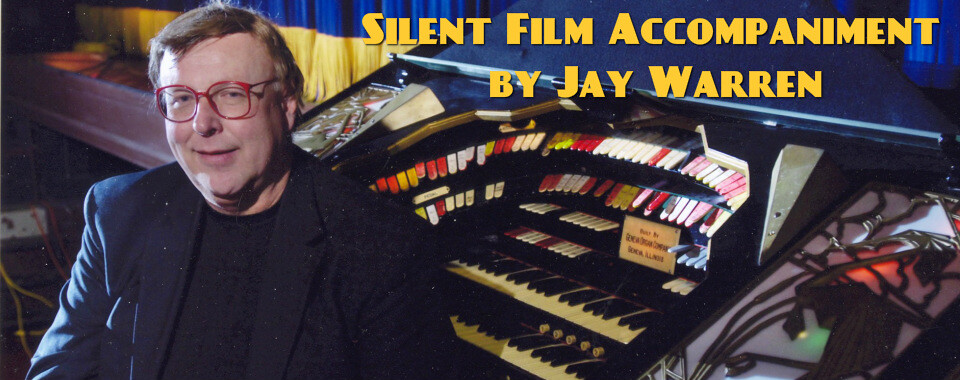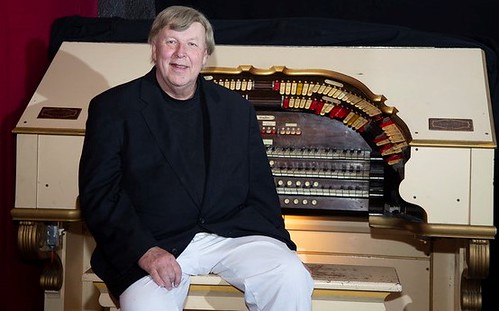Jay Warren is one of the foremost silent film accompanists in the country. He is the face of the Silent Film Society of Chicago and hosts the “Silent Summer” film festivals which, prior to COVID, had been held at the Filament Theatre. In addition to his own events, Jay is the house organist for the Pickwick Theatre Classic Film Series in Park Ridge. He performs at numerous venues all across the Midwest and continues to be a popular musical attraction for fans of silent cinema.
We recently caught up with Jay for a virtual interview…
MH: Jay, thank you for taking the time to be with us. What have you been up to this past year during the pandemic? Do you practice regularly?
JW: We kept busy preparing some new scores for films we hadn’t accompanied previously and tweaking our other scores. Not so much practice, but creating my own cue sheets and memorizing the same.
MH: You’ve been performing for many years in the Chicagoland area, but during COVID, the music has stopped. I’m sure you’ve reflected back on the many great events you’ve done in the past. Do you remember your very first experience playing for a theatre audience and what that was like?
JW: Can’t recall the very first film, but I do remember one film where I worked very hard to put together a score only to realize halfway through the film that I needed more material – and that is what I call “nothing music.” The silent film composer Erno Rapee once said that a film score was basically three parts: 1. Main theme and musical themes for the major characters; 2. Appropriate action music; and 3. the most difficult of all – the aforementioned “nothing music,” where you find yourself (as an accompanist) in between situations in a film often where the plot has slowed down. You have to be careful not to overplay, or to get caught up in some silly chord progressions. You just have to play some “nothing music.”
MH: Who were some of your biggest musical influences?
JW: Without a doubt, the late great organist Gaylord Carter. He was “discovered” accompanying films in a neighborhood Los Angeles theatre by Harold Lloyd, who took him under his wing eventually becoming featured organist at Grauman’s lavish Million Dollar Theatre. I had the pleasure of working with Gaylord a few times when he would come into Chicago, but the best part was going to Berghoff’s downtown and just letting him go on talking about the heyday of silent films. I humbly try to emulate his wonderful rousing film accompaniment style.
A couple of memorable events that I recall – once at the University of Chicago where we accompanied the newly restored (at the time) Fritz Lang’s “Metropolis.” The 35mm film print was delivered that afternoon directly from the Filmmuseum in Munich directly to the projection booth at UC. The intertitles were in German only, so we had a translator read them (via mics – did that make it a “talkie?”). The theatre was SRO and you could feel the charge in the air – went over very well with the audience.
Another time was at the Gateway accompanying Harold Lloyd in “Safety Last!” with Harold’s granddaughter Suzanne Lloyd introducing the film. Well, we had 1800 in attendance, and for the very first (and only) time I nearly was startled off the bench by the crowd reaction to the scene where Harold is stories above the street on the building’s ledge and a mouse crawls up his pant leg. 1800 people yelling out “OHHHH!!” all together got me – never saw it coming!
MH: Yes, who can forget those spectacular events at the Gateway Theatre– and seeing Suzanne Lloyd in person! Is there a silent film that you never get tired of accompanying?
JW: ANYTHING by Harold Lloyd, but especially “Girl Shy” and “Speedy.” Lloyd was a fantastic comedian who employed a large number of gifted gag writers. So it’s gag after gag after gag (all extremely well done) and of course you’re rooting for Harold despite his character’s ineptness, always coming out on top at film’s end and at the same time winning over the girl. (Usually Mildred Davis or Jobyna Ralston). Another film I love to accompany is “Wings” with Clara Bow, Richard Arlen, and Charles “Buddy” Rogers. In the famous deathbed scene with Arlen and Rogers I can hear them sniffling out in the audience. I always recommend two handkerchiefs for this film.
MH: I remember the wonderful scores you performed when we played “Speedy” and “Wings” at the Pickwick Theatre! Was there a film that was a real challenge for you, either in terms of its length or the mood you were trying to establish?
JW: “Nosferatu” is one the most popular horror films of all time. I’ve always got to be on my toes for the fast cutaway sequences where the Death Ship is on its way to port, at the very same time Thomas Hutter is making his way back home.
MH: Of all the venues you’ve appeared at, what is your favorite organ that you’ve played– and why?
JW: So many good ones for film – The magnificent 8,000-pipe Skinner organ at University of Chicago’s Rockefeller Chapel; the very grand Cassavant organ (now restored) at Emmanuel Episcopal Church in LaGrange; the cute little (but a barrel of dynamite) Wurlitzer organ at St. John Cantius; and of course the Pickwick Theatre’s original 1928 Mighty Wurlitzer (wonderful organ, needs TLC).
MH: Yes, our Pickwick organ will need a good tuning whenever we’re back! Do you have any events lined up post-pandemic? How can people find out more about the Silent Film Society of Chicago?
JW: I’ve just received inquiries for the fall, several in the Chicagoland area and two out-of-town (one east coast, one Texas y’all). Book now! silentfilmsjaywarren@gmail.com
Info about Jay: www.silentfilmsjaywarren.com plus Facebook.
Info at the Silent Film Society of Chicago: www.silentfilmchicago.com plus Facebook.

